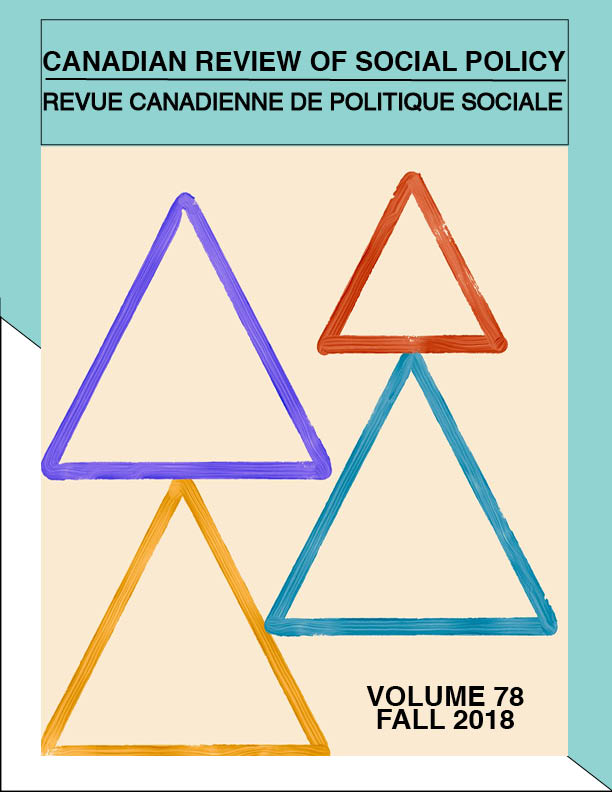Le Nouveau Régime: Épisode de la Mise en Oeuvre de Nutrition Nord Canada au Nunavik, 2011-2013
Keywords:
Nutrition Nord Canada, Sécurité alimentaire, Subvention, Nord, néolibéralismeAbstract
Cette étude examine la création et la mise en œuvre du programme Nutrition Nord Canada au Nunavik, entre 2011 et 2013. Ce dernier remplace le programme Aliments-poste, jugé inefficace et trop coûteux par le gouvernement fédéral, il était destiné à soutenir l’approvisionnement alimentaire des régions nordiques isolées du pays. L’étude est basée sur une série de documents et d’entrevues, ainsi qu’un suivi des prix à la consommation réalisé pendant cette période. L’étude montre que le passage d’un programme à l’autre était essentiellement basé sur l’application de la rationalité marchande à l’action publique, justifiant des réductions et restrictions du budget et des bénéfices, l’imposition des règles d’admissibilité et des procédures, la surveillance des opérations et le partage des responsabilités entre l’État, les entreprises et les citoyens. Pour bénéficier du programme, les entreprises devaient s’engager par contrat à réaliser les opérations les conduisant à toucher les subventions et à réduire les prix. Pour bénéficier de la réduction des prix, les citoyens devaient adapter leurs comportements d’achat aux normes de l’« alimentation saine », en dépit de leurs préférences. Ce programme est un exemple de régulation biopolitique des conduites, où la citoyenneté « active » est la condition d’accès aux bénéfices de l’action publique.
Abstract
This study explores the creation and implementation of the Nutrition North Canada program in Nunavik between 2011 and 2013. Nutrition North Canada replaces the Food Mail Program, intended to support the supply of food to the isolated northern regions of the country, and which was deemed ineffective and too costly by the federal government. The study is based on a series of records and interviews, as well as a follow-up of consumer prices during this period. It shows that the transition from one program to another was essentially based on the application of market rationality to public action, justifying reductions and restrictions of the budget and profits, the imposition of the rules of eligibility and procedures, oversight of operations and sharing of responsibilities between the state, businesses and citizens. To benefit from the program, companies had to commit to carry out the operations leading to receiving subsidies and reducing prices. To benefit from the price reduction, citizens had to adapt their purchasing behaviour to the standards of “healthy eating”, despite their preferences. This program is an example of biopolitical regulation of conduct, where “active” citizenship is the condition for access to the benefits of public action.
Key words: Nutrition North Canada; Nunavik; neoliberalism; public action; sociology
Downloads
Published
How to Cite
Issue
Section
License
1-The author guarantees that the manuscript is an original work not published elsewhere in print or electronically in whole or in part, except in abstract form, that the author has the full power to make this contribution, and that the manuscript contains no matter libelous or otherwise unlawful or which invades the right of privacy or which infringes any proprietary right.
2-The author guarantees that the manuscript has not been previously published in print or electronically and that if the manuscript contains any tables, figures or images fully reproduced or closely adapted from previously published material, the author must obtain the necessary permission from the author/publisher holding the original copyright prior to publication in CRSP. The author may be required to produce evidence of permission granted to CRSP’s editors.
3-As a condition of publication in CRSP, the author assigns all copyright to CRSP, including but not limited to the right to publish, republish, and otherwise distribute this manuscript in print, electronic, or other formats. As CRSP is a non-profit interdisciplinary scholarly journal, the author will receive no royalty or other monetary compensation for the assignment set forth in this agreement.
For the purpose of full disclosure, CRSP will not normally use the content provided by the author in a commercial venture, but for the purpose of disseminating the author’s content to as many readers as possible. For distribution, third parties engaging in commercial activities may be contracted to distribute the content globally, and such parties may make a profit out of the author’s content in their normal course of business. CRSP will not pay the author or reimburse the author in any form based on such commercial activities because the conduct of such commercial activities is outside the control of CRSP.
Any future reference to or use of this published material by the authors must acknowledge CRSP as the original place of publication.
PERMISSION REQUEST/ARCHIVING
Permission is given to author(s) receiving funding via Tri-Council Agencies, the Canadian Institutes of Health Research (CIHR), the Natural Sciences and Engineering Research Council of Canada (NSERC) and the Social Sciences and Humanities Research Council (SSHRC), to make their publications freely available in an Open Access repository within the stated deadline by the Tri-Council Agencies (12 months following publication). Archiving of publication must be a manuscript copy bearing none of the CRSP headers, footers or any other distinguishing marks. No links to the article on the CRSP website is permitted.
Permission requests from third parties to reproduce articles in part or full in academic/educational publications can be directed to the managing editor of CRSP, and will not be unreasonably denied.

